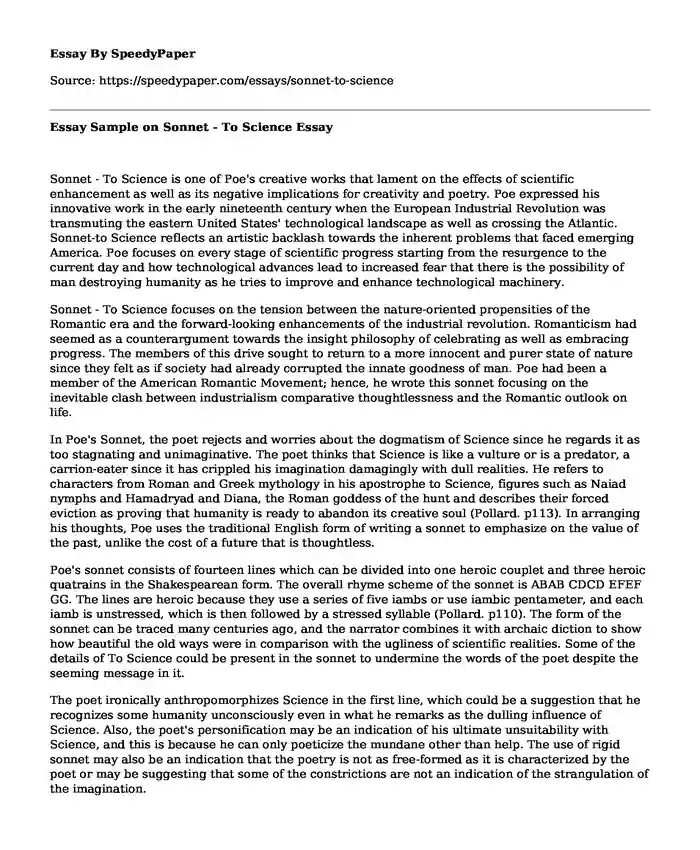
| Type of paper: | Essay |
| Categories: | Poem Edgar Allan Poe Industrial revolution |
| Pages: | 3 |
| Wordcount: | 669 words |
Sonnet - To Science is one of Poe's creative works that lament on the effects of scientific enhancement as well as its negative implications for creativity and poetry. Poe expressed his innovative work in the early nineteenth century when the European Industrial Revolution was transmuting the eastern United States' technological landscape as well as crossing the Atlantic. Sonnet-to Science reflects an artistic backlash towards the inherent problems that faced emerging America. Poe focuses on every stage of scientific progress starting from the resurgence to the current day and how technological advances lead to increased fear that there is the possibility of man destroying humanity as he tries to improve and enhance technological machinery.
Sonnet - To Science focuses on the tension between the nature-oriented propensities of the Romantic era and the forward-looking enhancements of the industrial revolution. Romanticism had seemed as a counterargument towards the insight philosophy of celebrating as well as embracing progress. The members of this drive sought to return to a more innocent and purer state of nature since they felt as if society had already corrupted the innate goodness of man. Poe had been a member of the American Romantic Movement; hence, he wrote this sonnet focusing on the inevitable clash between industrialism comparative thoughtlessness and the Romantic outlook on life.
In Poe's Sonnet, the poet rejects and worries about the dogmatism of Science since he regards it as too stagnating and unimaginative. The poet thinks that Science is like a vulture or is a predator, a carrion-eater since it has crippled his imagination damagingly with dull realities. He refers to characters from Roman and Greek mythology in his apostrophe to Science, figures such as Naiad nymphs and Hamadryad and Diana, the Roman goddess of the hunt and describes their forced eviction as proving that humanity is ready to abandon its creative soul (Pollard. p113). In arranging his thoughts, Poe uses the traditional English form of writing a sonnet to emphasize on the value of the past, unlike the cost of a future that is thoughtless.
Poe's sonnet consists of fourteen lines which can be divided into one heroic couplet and three heroic quatrains in the Shakespearean form. The overall rhyme scheme of the sonnet is ABAB CDCD EFEF GG. The lines are heroic because they use a series of five iambs or use iambic pentameter, and each iamb is unstressed, which is then followed by a stressed syllable (Pollard. p110). The form of the sonnet can be traced many centuries ago, and the narrator combines it with archaic diction to show how beautiful the old ways were in comparison with the ugliness of scientific realities. Some of the details of To Science could be present in the sonnet to undermine the words of the poet despite the seeming message in it.
The poet ironically anthropomorphizes Science in the first line, which could be a suggestion that he recognizes some humanity unconsciously even in what he remarks as the dulling influence of Science. Also, the poet's personification may be an indication of his ultimate unsuitability with Science, and this is because he can only poeticize the mundane other than help. The use of rigid sonnet may also be an indication that the poetry is not as free-formed as it is characterized by the poet or may be suggesting that some of the constrictions are not an indication of the strangulation of the imagination.
The main idea by the poet in the sonnet is that Science takes away poets' abilities by enforcing its dull truth and reality. A poet can never respect or love Science since it would prefer studying the stars rather than listening to his fantasies. It is because of Science that the old myths concerning nature and nymphs have lost their power, and it will never be possible for poets to dream easily.
Reference
Pollard, Derek. "The Postmodern Nineteenth Century:" Sonnet-To Science" and the Case for Poe's Avant-Garde Poetics." The Edgar Allan Poe Review 17.2 (2016): 105-115. Retrieved from https://muse.jhu.edu/article/638528/summary
Cite this page
Essay Sample on Sonnet - To Science. (2023, Jan 19). Retrieved from https://speedypaper.com/essays/sonnet-to-science
Request Removal
If you are the original author of this essay and no longer wish to have it published on the SpeedyPaper website, please click below to request its removal:
- Business Philosophy Essay Example
- The Criminal Law Essay Example
- Essay Sample Describing the Meaning of Happiness
- Japanese Culture Essay Sample
- Essay Example about Fundraising and Resource Development
- Financial Manager Roles and Responsibilities
- Paper Example. Sacred Time in Abraham Joshua Heschel's "The Sabbath"
Popular categories




